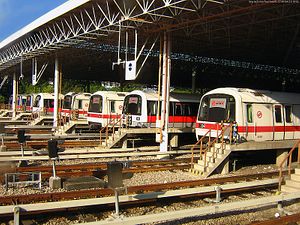Over the past few days, Singapore has been rocked by allegations that a Chinese manufacturer may have “secretly” recalled defective subway trains from the city-state with the complicity of its officials, threatening to fuel popular frustrations about the state of public transportation.
In 2009, China Southern Railway (CSR) Qingdao Sifang Locomotive and Rolling Stock Company and Kawasaki Heavy Industries were awarded a 22 billion yen ($217 million) contract to work with the Land Transport Authority (LTA) of Singapore to supply 22 six-car trains for the North-South and East-West lines of Singapore’s Mass Rapid Transit (MRT) system. The firms were also awarded another similar contract in 2014. Though each contract specified the exact division of labor between the firms, in general Kawasaki was responsible for the overall project design, procurement, and some manufacturing, while Sifang would be in charge of manufacturing, final fitting, assembly, and factory testing.
On July 5, the Hong Kong-based FactWire News Agency published an exclusive story with a source alleging that SMRT was “secretly shipping defective trains back to mainland China” for replacement and repair by Sifang. FactWire said its reporters had first witnessed two train cars wrapped in green covering being moved out of SMRT’s Bishan Depot at 1 am on June 12 and arriving at 3 am at Jurong Port with preparations clearly being made for their transport. CSR Sifang staff confirmed to reporters that the train had arrived at the factory on June 25 from Singapore, and the reporters themselves verified this independently after seeing the trains wrapped in the same covering with similar markings as well.
After an investigation into the matter, FactWire cited “multiple sources from mainland China and Singapore” as confirming that several problems had been found with the trains since they began service in 2011, including shattering glass windows, exploding batteries, and cracked structural components, including the sub-floor and bolster function parts connecting the car body to the bogie. The report also suggested that SMRT clearly knew about the issue and may have attempted to cover it up, with sources suggesting that it had reduced the frequency of the trains after malfunctions and that at least five train cars had been replaced since last year. If true, the allegations could feed into popular frustrations about the state of Singapore’s MRT, which last turned into an uproar following a major service disruption in July 2015.
On Monday, The Straits Times confirmed that the majority of Singapore’s first China-made public trains are being shipped back to the manufacturer after several defects were found, suggesting that the recall witnessed by FactWire was not an isolated incident and probably occurred with the knowledge of SMRT.
The newspaper quoted SMRT managing director Lee Ling Wee as saying that 26 of the 35 trains delivered by the Chinese manufacturer had cracks in the structure connecting the car body and the bogie following their delivery in 2013. The episode, The Straits Times said rather soberly, could “derail Singapore’s plans to raise its rail service and reliability standards.”
Lee said SMRT had been working closely with the Land Transport Authority and the manufacturer, China Southern Railway (CSR) Qingdao Sifang Locomotive and Rolling Stock Company, to resolve the issue. He added that the defective trains will be repaired by 2023.
While few additional specifics were given regarding how the trains are being repaired, FactWire disclosed the details of a four-month repair process where Kawasaki has been taking over the manufacturing of the flawed aluminum train car body, and CSR Sifang has been responsible for reassembling the train cars. One of the retired Singapore MRT staff it contacted also noted the seriousness of the situation: “I’ve never encountered a situation like this in all my decades of working in railway construction. Replacing the whole frame [of the train] – you can tell how serious [the problem] is.”

































